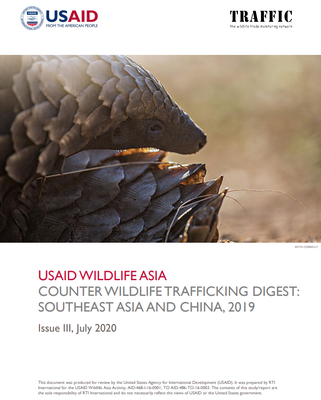New Counter-Wildlife Trafficking Digest by USAID and Traffic Reveals Illicit Trade Routes for Pangolins
The U.S. Agency for International Development (USAID) and TRAFFIC, the wildlife trade monitoring network, launched today the 3rd Annual Counter Wildlife Trafficking (CWT) Digest.
The report noted highlights in 2019 such as ground-breaking national legislation, strengthening of international collaborations, as well as significant steps forward in understanding and preventing the illegal wildlife trade in Cambodia, China, Lao PDR, Thailand, and Vietnam. Coupled with a series of high-profile seizures, these developments have moved the international community closer to understanding, tackling, and disrupting criminal syndicates and traffickers.
Despite such progress, seizures of illegal wildlife in 2019 resulted in approximately 155,000 kilograms (kg) of pangolin products, 48,000 kg of ivory, and 519 kg of rhino horn, substantially higher than the numbers cited in the 2018 CWT Digest.
The 3rd CWT Digest report also noted the following trends:
· The analysis of 2019 seizure data revealed “an illicit trading route of pangolins from Ethiopia to China,” which warrants follow-up research into whether this is an emerging trade route.
· Twenty ivory seizures in the focal countries involved online trading. Online wildlife trading has been increasing globally for some time.
· There are serious concerns about the high level of rhino poaching in South Africa linked to organized crime syndicates.
· Vietnam is an important part of the tiger trafficking route to China, having been implicated in four reported seizures in 2019.
“The U.S. Government takes wildlife trafficking very seriously as part of our efforts to stop transnational crime. Ending wildlife crime is an important U.S. foreign policy goal. It’s encouraging to see governments in the region and around the world working together for this cause,” said Craig Kirkpatrick, Regional Wildlife Conservation Advisor of USAID Regional Development Mission for Asia during the launch.
The CWT Digest summarizes patterns of illegal trade in elephant, tiger, pangolin, and rhinoceros products. Focused on Southeast Asia, the CWT Digest provides evidence to support decision-makers as they develop wildlife trafficking policies, enforce wildlife trade laws, and encourage consumers to stop their purchases of illegal wildlife products.
The virtual event welcomed over 70 representatives of the global counter wildlife trafficking community including representatives of U.S. government agencies, countries of Southeast Asia, and civil society organizations concerned about illegal trade in wildlife.
To download a copy of the report, please visit https://www.usaidwildlifeasia.org/resources/reports/inbox/cwt-digest-iii/view


